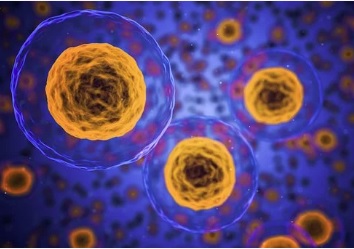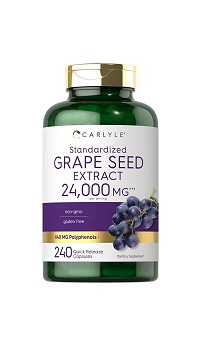

senolytics
As we age zombie-like senescent cells escape recycling by apoptosis and emit molecules that damage neighboring cells. Senolytics such as grape seed extract may be able to remove senescent cells.
According to Wikipedia, “The average adult human loses between 50 and 70 billion cells each day due to apoptosis.” Apoptosis is a normal process of cell death in which old cells are eliminated and disassembled. As we age increasing numbers of cells grow old and senescent without being properly eliminated by apoptosis. These zombie-like senescent cells emit dangerous molecules that cause inflammation, harm neighboring cells, and may be the root cause of aging. Senolytics are molecules that kill senescent cells without harming healthy cells. Pharmaceuticals like dasatinib and azithromycin, the experimental molecule navitoclax, and the flavonoids quercetin and fisetin have been used as senolytics.
To Stay Young, Kill Zombie Cells, Scientific American, October 25, 2017.
To play videos faster, click the settings gear icon along the bottom area of the videos and reset the “Playback speed”. To turn on closed captions click the CC button.
Clinical Trials & Senolytics | Dr. James Kirkland, Mayo Clinic, Foresight Institute, April 3, 2021. Video (1:06:52) Extensive text and slides summarizing the video.
NEW STUDY: Why YOU MUST combine a Senolytic with your NAD Booster (11:56) Dec 25, 2020. Review of an article, Another Win for Senolytics: Fighting Aging at the Cellular Level Just Got Easier, Singularity Hub, November 24, 2020 by Shelly Fan. Blind men-elephant analogy. 2020 study in Nature Metabolism by Campisi and Verdin found that senescent cells deplete NAD by activating CD38 macrophages. NAD, a molecule needed by mitochondria to produce energy, declines as we age. 2018 study in Nature Medicine by Kirkland found that transplanting senescent cells into mice shortened their lives and killing senescent cells with a senolytic cocktail of dasatinib and quercetin extended their lives. Race to find senolytics. Leaky sink stopper analogy. Senolytics which kill zombie cells could also increase NAD. NAD boosters to fill the sink. Senolytics to repair the stopper. Dasatinib, quercetin, navitoclax, fisetin. Other studies: First evidence that senolytics are effective at decreasing senescent cells in humans, Lancet, May 23, 2020; CD38 dictates age-related NAD decline and mitochondrial dysfunction through a SIRT3-dependent mechanism, Cell Metabolism, June 14, 2016; Send in the senolytics, Nature Biotechnology, Nov 12, 2020; Senolytic drugs: can this antibiotic treat symptoms of ageing?, Health Europa, June 10, 2020; Senolytic drugs: from discovery to translation, Journal of Internal Medicine, November 2020.
Grape seed extract
Grape seed extract is an inexpensive supplement that may prove to be a better senolytic for preventing the damaging effects of senescent cells.
SENOLYTICS: ELIMINATING SENESCENT CELLS / The Latest Updates [2022] (14:41) Feb 8, 2022. Second generation senolytics. Senescent cells fail to die in the normal process of apoptosis. Sometime excrete substances that harm neighboring cells and cause inflammation and disease. Senolytics developed to kill senescent cells. In petri dish tests, grape seed extract (PCC1) found most effective. Old mice treated with PCC1 were fitter and lifespan increased 9%. Median lifespan increased 64.2%. Another approach: smart bombs. Proteins on senescent cell surface used to identify. Third way: vaccination. Old cells characterized by a special protein (GPNMB). Vaccine created to immunize cells to the GPNMB protein. Vaccine reduced senescent cells and extended mouse lives. Strategies useful now: Grape seed extract. 100-300mg used in studies. Consult your doctor.
Cellular Senescence & Senolytics, playlist of 6 videos by Lance Hitchings including the one above, updated Feb 7, 2022.
Grape Seed Extract PCC1 Extends Lifespan | Review By Modern Healthspan (6:59) Dec 12, 2021. Review of a study, The flavonoid procyanidin C1 has senotherapeutic activity and increases lifespan in mice, Nature Metabolism, December 6, 2021. An inexpensive grape seed extract (PCC1) extends the healthspan and lifespan of mice. Known senolytics screened for effectiveness. PCC1 at low concentrations inhibits SASP (harmful senescent cell secretions). PCC1 at high concentrations kills senescent cells without harming viable cells. Different cell types treated with PCC1. Cancer suppressed with PCC1. Life extended with PCC1. PCC1 compares favorably to dasatinib and quercetin, and to fisetin. Early days so not changing supplements yet.
Grape seed extract – new senolytic extends lifespan? (8:15) December 15, 2021. Another review of 2021 Nature Metabolism study. Drawings of cell senescence and SASP. Dasatinib and quercetin, and fisetin undergoing human trials. Testing multiple senolytics on various cells. Grape seed extract did well without harming healthy cells. Mass spectrometry used to find PCC1 in grape seed extract. PCC1 given to aged mice every 2 weeks (hit and run) for 4 months. Strength, endurance, and lifespan increased. Will it work on humans? What’s the mechanism of action? Grape video.

